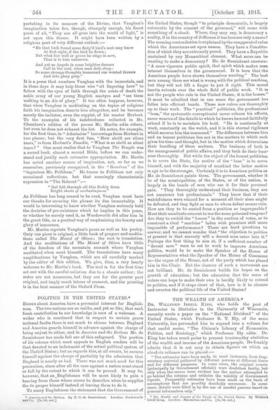POLITICS IN THE UNITED STATES. * Boos about America have a
perennial interest for English- men. The two nations are so unlike, and yet so like, that each fresh contribution to our knowledge is sure of a welcome. A writer who is convinced that in respect to certain grave national faults there is not much to choose between England and America guards himself in advance against the charge of being unjust to either, and in America and the Britons Mr. de Sumichrast has made full use of this safeguard. The portion of his volume which most appeals to English readers will be that devoted to an indictment of the actual political system of the United States ; but as regards this, at all events, he secures himself against the charge of partiality by the admission that England is nearly as bad. There was not much need for this precaution, since after all the case against a nation must stand or fall by the extent to which it can be proved. It may be, however, that an.Englishman will be more likely to gain a hearing from those whose errors he describes when he supplies the to pope himself instead of leaving them to do it.
To many Englishmen the statement that the Government of and Co. [7s. ed. not.] Diboll King. London; Macmillan and Co. Ors. ca. net.1 the United States, though "in principle democratic, is largely autocratic by the consent of the governed," will come with something of a shock. Where, they may say, is democracy a reality, if in the country of Jefferson it has become only a name The seeming contradiction is explained by the exaggerated value which the Americans set upon names. They have a Constitu- tion of which they are extremely proud. They have a Republic unstained by any Monarchical element. What more can be wanting to make a democracy P Mr. de Sumichrast answers : "A more vigorous public spirit, that spirit which makes men interest themselves in the government. It is here that the American people have shown themselves wanting." The best men among them see what is wrong with the political machine, but they will not lift a finger to put it right. This morel inertia extends over the whole field of public work. " It is not the people who rule in the United States; it is the bosses." It must be admitted that in one sense the government has fallen into efficient hands. These new rulers are thoroughly up to their work. The "practical" politician, the professional "boss," the systematic corruptionist never relaxes his efforts, never wearies of the details to which be knows he must faithfully attend if he is to maintain his hold. "He is continually at work, constantly on the watch, and it is this eternal vigilance which secures him the command." The difference between hint and an honest politician lies not in the matters to which each gives his time and thought, but in the motive which determines their handling of these matters. The business of both is the management of public affairs, and they both do their busi' ness thoroughly. But while the object of the honest politician is to serve the State, the motive of the "boss" is to serve himself, and with the majority of mankind the latter motive is apt to be the stronger. Certainly it is in American politics as Mr. de Sumicbrast paints them. The government, whether it be of the municipalities, of the States, or of the nation, is largely in the hands of men who use it for their personal gain. "They thoroughly understand their business, they are not amateurs but professionals." They know that if their watchfulness were relaxed for a moment all their aims might be defeated, and they fight as mon to whom defeat means ruin. How are they to be ousted from a position so impregnable P Must their assailants consent to use the same poisonedweapons ire they to outbid the " bosses " in the auction of votes, or to construct a rival " machine" laden with promises still more impossible of performance P These are hard questions to answer, and we cannot wonder that "the objection to politics at present is that scarcely will a decent man enter into it," Perhaps the first thing to aim at, if a sufficient number of "decent men" were to set to work to improve American politics, would be to snake the Speaker of the House of Representatives what the Speaker of the House of Commons is—the organ of the House, not of the party which has placed him in the Chair. But the chances of such a movement are not brilliant. Mr. de Sumichrast builds his hopes on the growth of education ; but the education that the mass of voters can hope to make their own is hardly likely to extend to politics, and if it stops short of that, how is it to cleanse and sweeten the political life of the United States ?






































 Previous page
Previous page